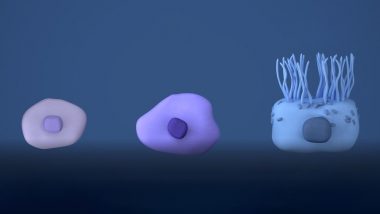In a medical breakthrough, stem cells helped save an infant’s life for the first time in the world. A Mumbai hospital, successfully treated a premature baby suffering from chronic, life-threatening lung disease by harnessing stem cell technology. According to a Times of India report, it is the first such documented case in the world. Surya Hospital from Santacruz made medical history by using stem cells for neonatal treatment, but not without sparking an ethical debate.
As per the regulations of the Indian Council of Medical Research (ICMR), using stem cells for neonatal procedures has not been approved. But the hospital claims that they took the step to save the child’s life and to encourage research about the procedure. Indian Doctor Angers Sri Lankans After He Recommends Stem Cells to “Treat” Autism in Children.
Chandivli couple Pramod and Meenakshi Dubey’s baby boy Rudransh was born prematurely and suffered from a severe form of bronchopulmonary dysplasia, a disease that destroys lungs. He was born in the 27th week of gestation and weighed a measly 600gms. The baby was placed on the ventilator for four months and showed no signs of recovery despite using steroids and other standard lines of treatment.
Dr Nandikishore Kabra, director, neonatal ICU at Surya Hospital told TOI that the hospital used stem cells to treat the preemie baby upon insistence from the parents. Scientists Make Same-Sex Mice Have 29 Babies Using Stem Cells and Gene Editing, View Pics!
The team of doctors came across two studies where umbilical cord blood-derived mesenchymal cells to prevent BPD. Within just two weeks of injecting 40 million stem cells into the child’s chest, the hospital claimed that they saw stark improvement in the baby’s condition. Rudransh was discharged in March after nine months in the hospital. He now weighs five kilograms.
But despite the hospital’s claims that it disregarded ICMR regulations only to save the child’s life, ethics questions have been raised regarding their decision. To carry out such procedures, the hospital at least requires approval from the National Apex Committee for Stem Cell Research and Therapy.
What are Stem Cells?
Stem cells are also known as somatic cells, which are essentially “blank.” As the organism develops, stem cells also “grow up” and get differentiated into skin, muscle, blood, bone or lung cells.
There are three types of stem cells – embryonic cells, cells and perinatal stem cells. Embryonic cells are sourced from embryos that are three-five days old, adult stem cells are derived from bone marrow or fat and perinatal stem cells are taken from amniotic fluid or umbilical cord blood.
Due to this trait of stem cells, medical science has been exploring the possibility of using them for the treatment of diseases which are degenerative and progressive. For example, if a person’s nerve tissues have been damaged, stem cells can be used to regrow new nerve tissues.
What Are The Ethical Problems of Using Stem Cells?
While it offers great promise, stem cell therapy that uses embryonic cells also raises ethical controversies. Since embryonic cells are derived from new embryos, there are moral questions about how they are sourced.
To prevent illegal practices of sourcing stem cells from healthy embryos, the National Institutes of Health instructs using cells from in vitro fertilisation only when the embryo is no longer needed.
(The above story first appeared on LatestLY on Apr 26, 2019 01:33 PM IST. For more news and updates on politics, world, sports, entertainment and lifestyle, log on to our website latestly.com).













 Quickly
Quickly




















